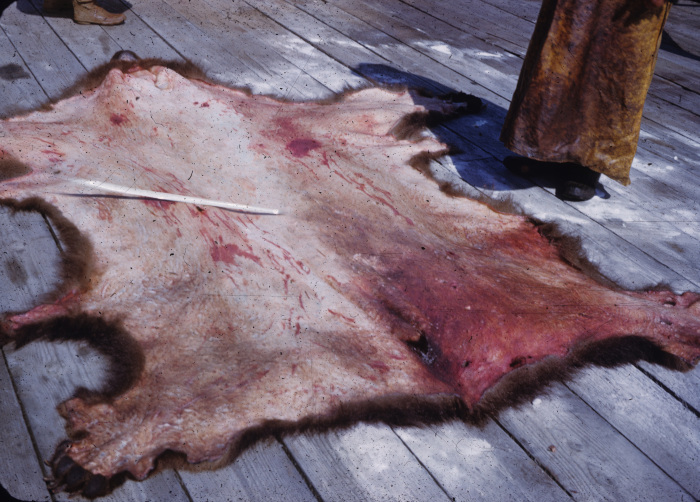Inside out (to be) — Ullngaluni
Ullngauq. – It is inside out.

Photo: A brown bear hide being scraped clean. Nekeferoff collection, AM580
In the Alutiiq language, speakers build words by combining word parts. Roots, bases, post bases, suffixes, and enclitics are terms for the small pieces of words used to make nouns, verbs, adjectives, and even one-word sentences. Each of these word parts has a different function. Roots act as the stem or base at the start of a noun or a verb. Roots are not words. They can’t be used alone. However, they provide the foundation for creating a word. There are many types of roots. Some indicate the part of speech of a word, while others clearly express relationships between words. Postural roots are word parts that illustrate the position or posture of a speaker or an object. There are many of these roots like numig- turned over, nangar-- standing up, or kingupir- backwards.
The verb ullngaluni, comes from the postural root ullte- meaning to turn inside out. Turning animal parts inside out is an important part of transforming harvested resources into food and materials. People reverse animal pelts inside out to scrape them clean for tanning and drying. They invert animal guts to remove the membrane and content clinging to the inside. Similarly, harvesters turn the hood of an octopus inside out to remove the animal’s guts. Then, they beat the body of the octopus on a rock to tenderize it, stopping intermittently to rub the carcass on a rock and rinse it. This process makes the meat less chewy.
The verb ullngaluni, comes from the postural root ullte- meaning to turn inside out. Turning animal parts inside out is an important part of transforming harvested resources into food and materials. People reverse animal pelts inside out to scrape them clean for tanning and drying. They invert animal guts to remove the membrane and content clinging to the inside. Similarly, harvesters turn the hood of an octopus inside out to remove the animal’s guts. Then, they beat the body of the octopus on a rock to tenderize it, stopping intermittently to rub the carcass on a rock and rinse it. This process makes the meat less chewy.
